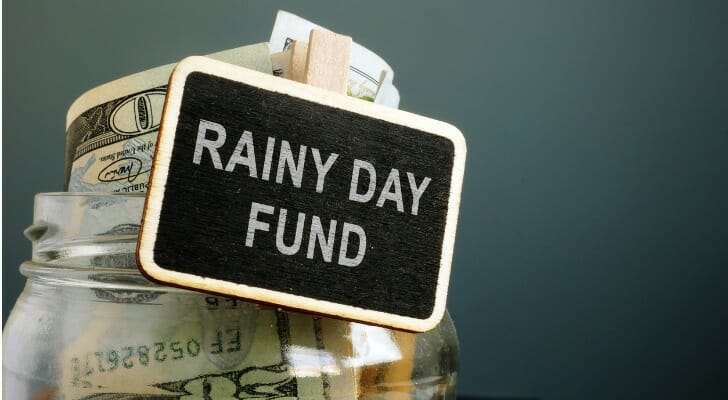 When deciding where to save and invest, your choices will depend on your goals, time frame for saving and risk tolerance. A money market fund is one option; a money market account is another. While they sound similar, they actually work very differently when it comes to growing your money over time. Further, only one of these is insured against loss by the FDIC. Understanding the differences between a money market account and a money market fund can help you decide which one to include in your saving and investing plans. You may want to consider working with a financial advisor who can help put together the right investment strategy for your goals.
When deciding where to save and invest, your choices will depend on your goals, time frame for saving and risk tolerance. A money market fund is one option; a money market account is another. While they sound similar, they actually work very differently when it comes to growing your money over time. Further, only one of these is insured against loss by the FDIC. Understanding the differences between a money market account and a money market fund can help you decide which one to include in your saving and investing plans. You may want to consider working with a financial advisor who can help put together the right investment strategy for your goals.
What Is a Money Market Fund?
A money market fund is an investment vehicle, rather than a deposit account. You can invest in money market funds through an online brokerage, either inside a tax-advantaged savings account like an IRA or through a taxable brokerage account. A money market fund is essentially a type of mutual fund that holds other securities, such as U.S. Treasurys and corporate bonds. The nature of these securities is usually short-term and the focus is conservative growth, rather than aggressive growth.
Since money market funds are an investment, not a deposit account, they’re not insured by the FDIC or NCUA. That means there is a possibility that you could lose some or all of the money you invest in a money market mutual fund. But when you compare them to other investments, money market funds are less risky than individual stocks or funds that invest in stocks.
Compared to other mutual fund options, money market funds may have a lower minimum investment. But you may need more money to invest in one versus opening a money market savings account, depending on which brokerage you’re investing with.
Money market funds also carry different fees compared to a money market account. Instead of paying a monthly maintenance fee, for example, you’d pay an expense ratio instead. This expense ratio reflects the cost of owning a money market fund annually, expressed as a percentage. Generally, you want a fund with a lower expense ratio, since fees detract from your investment earnings.
What Is a Money Market Account?

A money market account is a deposit account that you can open at a brick-and-mortar bank, online bank or credit union. This type of account can combine features of a checking account and a savings account (indeed, they’re sometimes referred to as money market savings accounts).
For example, you may be able to write checks from a money market account, or the bank may give you a debit card or ATM card you can use for purchases or ATM withdrawals. Or you can schedule bill payments from your account and set up automatic deposits from, or transfers to, other bank accounts. Those features make a money market account similar to a checking account.
But there are other things that make money market accounts more like savings accounts. For example, you may be limited on the number of withdrawals you can make from a money market account each month. Following federal guidelines, banks can limit you to six withdrawals per month from a money market savings account and once you go over that limit, a fee may apply.
Bank Account Comparison
| Savings Account | Checking Account | Money Market Account | |
| Insured by the FDIC | Yes | Yes | Yes |
| Earns Interest | Yes | Usually No | Yes |
| Can Write Checks | No | Yes | Yes |
| Comes With a Debit Card | No | Yes | Yes |
| Unlimited Transactions | No | Yes | No |
Money market accounts can also earn interest like a regular savings account would. The annual percentage yield you can earn varies from bank to bank but this type of account offers flexibility since you can access it easily, along with the potential to grow your money over time as you earn interest on deposits.
As long as you’re keeping your money market account at a financial institution that’s FDIC-insured or NCUA-insured in the case of credit unions, you’re protected against financial losses, up to the FDIC’s coverage limit for your account ownership type. Money market accounts may have minimum deposit requirements to open, depending on the bank. You may also pay a monthly maintenance fee or have to observe a minimum balance requirement to avoid a service fee.
Money Market Account vs. Money Market Fund: Which Should You Use?
Knowing the differences between a money market account and a money market fund can help you decide when to use one or the other. For example, a money market account can be useful for saving toward certain goals. You might use a money market savings account for:
- Keeping a liquid emergency (rainy day) fund
- Saving money for a car purchase
- Saving money for a down payment on a home
- Setting aside funds for improvements or repairs if you already own a home
Money market accounts are easily accessible since you can link one to your checking account for easy transfers. Check-writing abilities and a debit or ATM card give you even more options for withdrawing from money market savings. And you may be able to earn a better APY with a money market account than you would a regular savings account or even a certificate of deposit account.
Money market funds, on the other hand, might be more appealing if you’re looking for a higher rate of return. While money market mutual funds are conservative by nature, they may still yield more growth over time compared to a money market account. You just have to keep in mind that money market funds pose a little more risk since your money is invested in securities. And you also have to factor in the expense ratio and potential tax implications associated with keeping money market funds in an IRA or taxable account.
The Bottom Line
 Whether you need a money market account or a money market fund depends on what you want to do with your money. A money market savings account can offer a safe way to set aside money for short-term goals or long-term goals while still keeping that money liquid so you can tap into it when you need it. A money market fund can be used for the same purposes but your money could grow faster if you’re getting a better rate of return. If you have multiple financial goals you’re working toward, it could make sense to have both. Just remember to consider the minimum deposit requirements and fees before saving in either one.
Whether you need a money market account or a money market fund depends on what you want to do with your money. A money market savings account can offer a safe way to set aside money for short-term goals or long-term goals while still keeping that money liquid so you can tap into it when you need it. A money market fund can be used for the same purposes but your money could grow faster if you’re getting a better rate of return. If you have multiple financial goals you’re working toward, it could make sense to have both. Just remember to consider the minimum deposit requirements and fees before saving in either one.
Tips for Investing
- Consider talking to a financial advisor about whether a money market account or money market fund is a good idea for your situation. If you don’t have an advisor yet, finding one doesn’t have to be hard. SmartAsset’s free tool matches you with up to three vetted financial advisors who serve your area, and you can interview your advisor matches at no cost to decide which one is right for you. If you’re ready to find an advisor who can help you achieve your financial goals, get started now.
- If you’re not sure if a money market account or fund is right for you then you should check out short-term alternatives. Make sure to consider both risk and reward when making decisions about short-term investments.
Photo credit: ©iStock.com/Nikada, ©iStock.com/designer491, ©iStock.com/Chinnapong